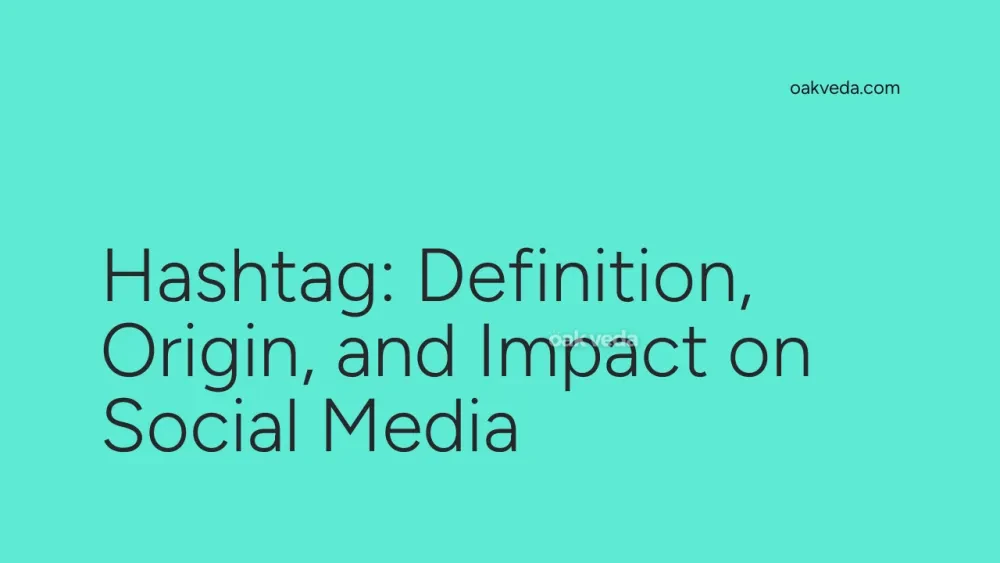
What is a Hashtag?
A hashtag is a word or phrase preceded by the "#" symbol, used primarily on social media platforms to categorize content and make it easily discoverable. This simple yet powerful tool has revolutionized the way we communicate and share information online.
Origin and Development of Hashtags
The hashtag as we know it today was born on Twitter in 2007. Chris Messina, a social technology expert, proposed using the "#" symbol to group related tweets. Twitter initially rejected the idea but later embraced it, officially adopting hashtags in 2009.
Since then, hashtags have spread to other social media platforms, including Instagram, Facebook, LinkedIn, and TikTok. Each platform has adapted the use of hashtags to suit its unique features and user base.
How Hashtags Work
Hashtags function as clickable, searchable links within social media posts. When a user includes a hashtag in their content, it becomes part of a larger conversation. Here's how they work:
- Categorization: Hashtags group similar content together.
- Discoverability: Users can search for specific hashtags to find related content.
- Trending Topics: Popular hashtags often become "trending topics" on platforms like Twitter.
- Community Building: Hashtags can create virtual communities around shared interests or events.
Types of Hashtags
Hashtags come in various forms, each serving a different purpose:
- Branded Hashtags: Created by companies for marketing campaigns (#ShareACoke)
- Event Hashtags: Used for conferences, TV shows, or live events (#Oscars2023)
- Cause Hashtags: Support social movements or charitable causes (#BlackLivesMatter)
- Content Hashtags: Describe the type of content being shared (#TravelTuesday)
- Trending Hashtags: Popular topics of the moment (#BreakingNews)
Popular Examples of Hashtags
Some hashtags have made a significant impact on social media and beyond:
- #MeToo: Sparked a global movement against sexual harassment and assault.
- #IceBucketChallenge: Raised awareness and funds for ALS research.
- #ThrowbackThursday or #TBT: Encourages users to share nostalgic content.
- #FollowFriday or #FF: Used to recommend accounts to follow.
Impact of Hashtags on Social Media Culture
Hashtags have profoundly influenced social media culture in several ways:
- Amplifying Voices: Hashtags have given individuals and marginalized groups a platform to share their stories and perspectives.
- Real-time Communication: During breaking news events, hashtags enable rapid information sharing and updates.
- Marketing Tool: Brands use hashtags to increase visibility and engage with their audience.
- Meme Culture: Many internet memes originate from or are popularized by hashtags.
- Social Movements: Hashtags have become powerful tools for organizing and spreading awareness about social and political issues.
Controversies Surrounding Hashtags
While hashtags have many benefits, they're not without controversy:
- Hashtag Hijacking: When users or brands use a popular hashtag inappropriately or to push their own agenda.
- Slacktivism: Criticism that using hashtags for social causes doesn't lead to real-world action.
- Oversaturation: The overuse of hashtags can make posts look spammy and reduce their effectiveness.
- Privacy Concerns: Public hashtags can expose users' content to a wider audience than intended.
How Brands and Influencers Use Hashtags
Brands and influencers leverage hashtags to:
- Increase Reach: Using popular hashtags can expose content to a broader audience.
- Build Brand Identity: Creating unique branded hashtags helps establish a recognizable online presence.
- Run Contests: Hashtags are often used to collect user-generated content for competitions.
- Track Campaign Performance: Brands can measure the success of campaigns by monitoring hashtag usage.
- Engage with Followers: Hashtags create opportunities for two-way communication with audiences.
Future Trends Related to Hashtags
As social media evolves, so do hashtags. Some emerging trends include:
- AI-powered Hashtag Suggestions: Platforms are developing smarter algorithms to recommend relevant hashtags.
- Visual Hashtags: The rise of image and video-based platforms may lead to more visual representations of hashtags.
- Hashtag Commerce: Shoppable hashtags that link directly to products or services.
- Cross-platform Hashtag Integration: Improved consistency and tracking of hashtags across different social media platforms.
FAQs about Hashtags
-
How many hashtags should I use in a post? It depends on the platform. On Instagram, up to 30 hashtags are allowed, but 5-9 is often considered optimal. On Twitter, 1-2 hashtags per tweet is generally recommended.
-
Can I create my own hashtag? Yes, anyone can create a hashtag. However, it's wise to check if it's already in use to avoid confusion.
-
Do hashtags work on all social media platforms? While most major platforms support hashtags, their effectiveness and usage can vary. They're particularly popular on Twitter, Instagram, and TikTok.
-
Are hashtags case-sensitive? No, hashtags are not case-sensitive. #HelloWorld and #helloworld will lead to the same results. However, using camel case (capitalizing each word) can improve readability.
-
Can hashtags include spaces or special characters? Hashtags cannot include spaces. Special characters like &, %, and @ will break the hashtag. Numbers are allowed.
In conclusion, hashtags have become an integral part of social media communication, offering a powerful way to categorize content, join conversations, and increase visibility. As social media continues to evolve, hashtags will likely adapt and remain a crucial element in online interactions.
You may be interested in:
- "Sending Me": Definition, Origin, and Impact
- Beacons: Definition, Origin, and Impact on Social Media
- IB (Inspired By): Definition, Origin, and Impact
- IJBOL: Definition, Origin, and Impact on Social Media
- Scrubbing: Definition, Origin, and Impact on Video Content
- TikTok SEO: Definition, Origin, and Impact on Content Strategy

